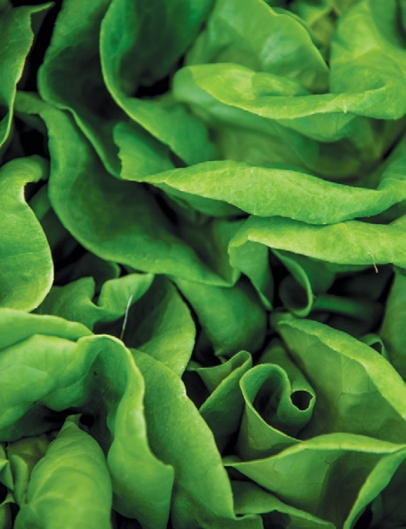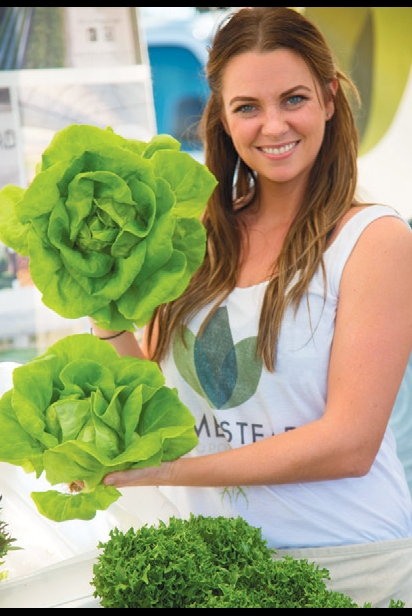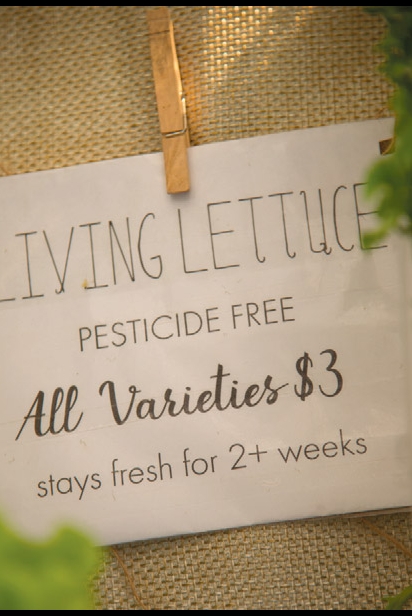Homestead Hydroponics
After a long day at the Phillippi Farmhouse Market, Sarah Whannel greets me with an energetic enthusiasm and welcomes me to the Homestead Hydroponic Farm. I take a moment to recognize the awe-inspiring surroundings and breathe in the air that feels as fresh as if it had been purified multiple times. This vast farmland is situated next to the Myakka State Park, just 20 miles or so outside of town.
A well-built farmhouse—where Whannel and her partner, Michael Baker, reside—stands almost protectively in front of the greenhouses out back. We step inside the cleanest, most organized operation of hydroponic growing I’ve ever seen. Whannel graciously gives credit for this to Baker, whom she describes as a “perfectionist.” He’s a former yacht manager, which explains the tip-top shape of the greenhouses. Stark white floors are offset by abundant rows of vibrantly hued green lettuces.
This bounty is available to us at both the Wednesday Phillippi Market and on Saturday at the Sarasota Farmers’ Market, but what’s especially exciting is Homestead Hydroponics’ partnership with Sarasota County Schools. They are supplying 600–1,200 heads of lettuce to the schools a week!
Beverly L. Girard, PhD, MBA, RD, Dietetic Internship Program Director Food and Nutrition Services of the School Board of Sarasota County, sought them out and made the connection between the schools and Homestead Hydroponics. For Girard, it was important to supply local produce to the schools. There was no reason to be importing from Mexico when this lavishness is available in our backyard.
The appeal isn’t only that this food is local; it is also 100% clean, pesticide-free, nutrient-dense food that uses only one-tenth of the water required by traditional farming. And because the growing takes place elevated in the greenhouses, Homestead Hydroponics can grow twice the amount of food in the same amount of space with longer growing seasons.
Half of Homestead’s production goes to the Sarasota County Schools, which supplies 25 percent of the schools’ produce. The eventual goal is to supply the schools with 100 percent. They are the pioneers of this type of partnership and because of this, the schools are partially responsible for expanding the farm, which started with just one greenhouse and now there are multiple with plans to build even more. Because of the growth, Whannel has enlisted the help of her sister and brother-in-law, Alley and Neil O’Connor, full time. Everything is done by hand together as a team.
Butterhead is the main type of lettuce supplied to the schools and they also grow specialty varietals such as red oak leaf, red and green lollo, cherry tomatoes, cucumbers, and super greens, which include these beautiful edible brightly colored flowers that pack a spicy punch.
At Booker Middle School alone, there has been a 40 percent increase of lettuces eaten by the students. It’s noticeable that more students are going to the salad bar, but not surprising.
“What’s being offered looks good and tastes good,” says Whannel. “You just have to give them the right choices. We are grateful and thankful for the people making changes in the public school systems.”
Both Whannel and Baker grew up in Sarasota, so shifting their career focus to bringing something to the table that is making a difference in the community is the true honor of running the hydroponic farm. Currently, Baker is helping to educate and consult with the schools on hydroponic growing methods and getting them set up with their own operations.
“It’s making a difference,” Whannel says. “We didn’t even have a salad option when we were growing up. It’s a labor of love and I feel we produce a good-quality product that people love and come back for.”







